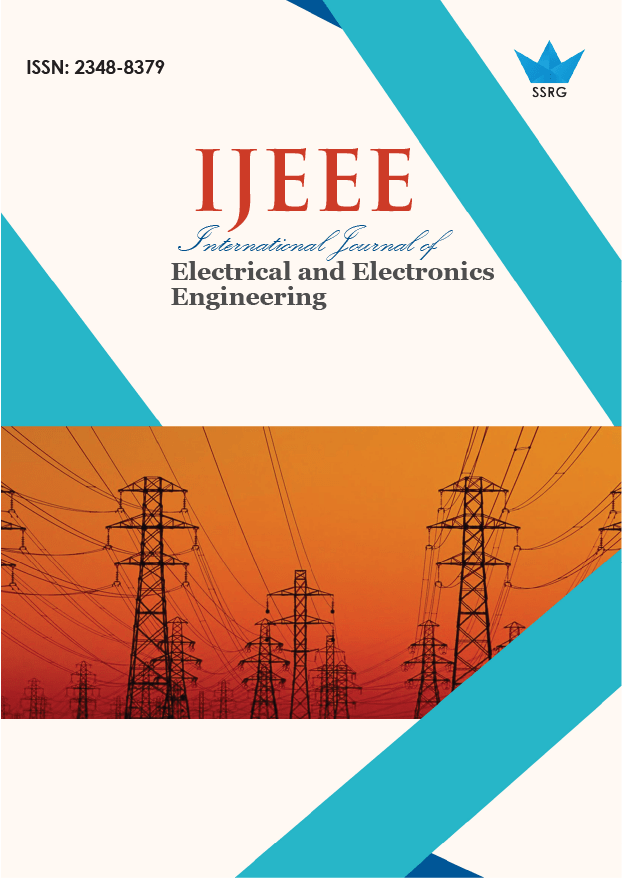Research Application of ANFIS Controller to Determine and Maintain the Maximum Capacity Working Point of the Grid-Connected Solar Power System

| International Journal of Electrical and Electronics Engineering |
| © 2021 by SSRG - IJEEE Journal |
| Volume 8 Issue 1 |
| Year of Publication : 2021 |
| Authors : To Van Binh |
How to Cite?
To Van Binh, "Research Application of ANFIS Controller to Determine and Maintain the Maximum Capacity Working Point of the Grid-Connected Solar Power System," SSRG International Journal of Electrical and Electronics Engineering, vol. 8, no. 1, pp. 10-14, 2021. Crossref, https://doi.org/10.14445/23488379/IJEEE-V8I1P102
Abstract:
Solar energy is a clean and endless source of energy that nature bestows on man. Since ancient times, people have been able to utilize this energy source for themselves. There are medium and large scale solar power plants connected to the grid or buildings using solar power at the household scale family. Grid-connected solar power systems are increasingly being used to exploit this infinite renewable energy source. In this system, the maximum power emitted by photovoltaic (PV) panels depends on the sun's radiation intensity and the working temperature of the equipment. For each value of solar radiation intensity and photovoltaic panel temperature, there is one point of maximum power emitted by the panel, called the maximum power point (MPP). To improve the device's efficiency, it is necessary to maintain the system working in accordance with the maximum power point when the radiation intensity of the sun and the panel temperature change. This paper presents a method for determining and maintaining the maximum power working point of a grid-connected solar PV system using an adaptive neural-fuzzy inference system (ANFIS). The simulation results show that with different intensity of solar radiation and temperature change, the system's working point always stick to the point with maximum power.
Keywords:
ANFIS, Maximum power point, MPPT, PV System.
References:
[1] L. K. Lai, Roan Van Hoa, Flywheel Energy Storage in Electrical System Integrates Renewable Energy Sources, SSRG International Journal of Electrical and Electronics Engineering ( SSRG - IJEEE ), 7( 6) (2020), 27-32.
[2] J. S. Lee, K. B. Lee, Variable dc-link voltage algorithm with a wide range of maximum power point tracking for a two-string PV system, Energies, (2013), 58–78.
[3] Shen, C.L.; Tsai, C.T., Double-linear approximation algorithm to achieve maximum-power-point tracking for photovoltaic arrays, Energies (5) (2012), 1982–1997.
[4] Yau, H.T.; Wu, C.H., Comparison of extremum-seeking control techniques for maximum power point tracking in photovoltaic systems, Energies.(4)(2011), 2180–2195.
[5] Reisi, A.R.; Moradi, M.H.; Jamasb, S., Classification and comparison of maximum power point tracking techniques for the photovoltaic system: A review. Renew. Sustain, Energy Rev., (19) (2013) 433–443.
[6] Le Thi Minh Tam, Nguyen Viet Nhu, NguyenmVan Duong, Nguyen Thanh Tien, (2015), A proposed maximum power point tracking method for photovoltaic based on variable structure fuzzy control, Proceeding of science workshop of TNUT.
[7] Lai Khac Lai, Fuzzy Logic Controller for grid-connected, single-phase Inverter, Journal of Science and Technology - Thai Nguyen University., (02) (2013).
[8] M.B. Eteiba, E.T.EI Shenawy, J.H Shazly, A.Z. Hafez, (2013), A photovoltaic (Cell, Module, Array) Simolation and Monitoring Model using MATLAB/GUI Interface, International Journal of Computer Application (0975-8887) (69) (2013).
[9] Haruil Nissah Zainudin, Saad Mikhilef , Comparision Study od Maximum Poer Point Tracker Technique fo PV Dystems, Proceeding of the Middle East Power System Conference(MEPCON’10), Cairo University, Egypt, December 19-21, Paper ID278.
[10] Ricardo Antonio-Mendez, Jesus de la CruzAlejo and Ollin Peñaloza-Mejia, (2014), Fuzzy Logic Control on FPGA for Solar Tracking System, Proceedings of the musme conference held in Huatolco, Mexico, 21-24.
[11] Dipti Bawa, C.Y. Patil Department of Instrumentation and Control, College of Engineering, Pune, Fuzzy control based solar tracker using Arduino Uno, International Journal Of Engineering and Innovative Technology (IJEIT) 2(12), (2013).

 10.14445/23488379/IJEEE-V8I1P102
10.14445/23488379/IJEEE-V8I1P102